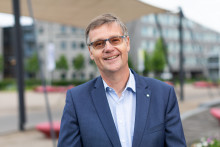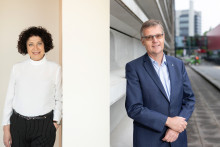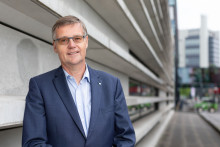The UT aims that no more than one hundred students may attend an examination. 'We do our best to keep to this and to arrange everything well, with group sizes being kept to a minimum and, where possible, online exams. In the majority of cases this works out all right,' says Veldkamp. The physical exams take place in extra large locations that have been tested for ventilation - we even extend to the Grolsch Veste, tables are spaced more than 1.5 metres apart, there are online options and exams are spread across different locations. But yes, excesses of exams with more than a hundred students do occur.'
Above all, the UT wants to guarantee the quality of the diplomas, says the rector. 'That is the main reason why we leave it up to the study programmes and that we, as the Executive Board, do not want to micromanage or take a generic decision. The programmes know best what end terms they should apply. It also plays an important role in the accreditation of the programmes. And ultimately it is up to the examination boards to guarantee the quality of an examination ánd diploma. So it is not a coincidence that ultimately the chairpersons of the examination boards sign off on students' diplomas. They guarantee the quality of your diploma - and that quality must be leading at all times.'
Moving online?
A seemingly logical solution, all exams online, is therefore not an obvious one for the rector. 'In the first wave, everything had to be online, but we noticed that this came with the necessary problems. Qualitatively speaking, a physical exam is preferred by many teachers, also with regard to the prevention of exam fraud', says Veldkamp. And, he emphasises, even if teachers tend towards an online exam, it must also fit in with the course concerned and the examination material. 'Differential equations can't just be done on a keyboard, they have to be done on paper or on a tablet,' the rector points out.
From the third quartile onwards, more will be possible in the field of online surveillance and proctoring, Veldkamp promises. 'We have already signed contracts for proctoring software, with good privacy agreements, for example about data storage within the EU.' For online surveillance, the UT has signed a contract with the previously controversial Zoom. 'As I understand it, the security problems have been solved.'
Catch-22
But even a digital fallback option will not be a solution for all exams, the rector knows. In its search for solutions, the UT finds itself in a new catch-22 situation time and again. 'This remains a complicated puzzle which even we, the Executive Board, cannot solve to our one hundred per cent satisfaction,' Veldkamp sighs.
For every 'what if' scenario, there is a 'yes, but' answer. Taking exams with smaller groups? 'Then, given the pressure on the facilities and people, we would have to move to the evenings. All of us would rather not do that and it is maybe impossible if we have a curfew.' More oral or open book exams? 'Then it has to be possible and appropriate to the subject, depending on the demand for reproduction or synthesis.' Different versions of the same exam? 'Then you risk unequal treatment of students and it requires even more from lecturers.'
Because the work pressure on teachers is very high, especially in times of crisis, the rector sees. 'Teachers have displayed a very adaptive attitude, for which I absolutely want to express my appreciation. We cannot come up with top-down, one-size-fits-all measures. We simply cannot ask more of teachers. What we can do is fully trust them to make the best possible decisions.'
Own behaviour
The rector therefore calls on students and teachers to trust each other. 'It is a two-way street. Everyone is fed up with the situation, but we have to try to continue to put our shoulders to the wheel together.' And, Veldkamp hurries to say: 'The exam halls are safer than the local Albert Heijn, as long as we stick to the rules. That is why I call on students to think carefully about their own behaviour. Do not leave the hall together, keep a distance from each other... Even if you have a small chance of becoming seriously ill yourself, we stick to the measures for the vulnerable among us. That also applies in the exam halls.'






